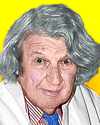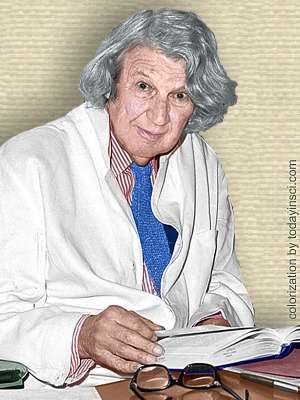 (source)
(source)
|
John Z. Young
(18 Mar 1907 - 4 Jul 1997)
English zoologist and neuroscientist whose career began as a cephalopod biologist, curious also in physiology, experimental psychology and philosophy, but then became a neuroscientist. He paved the way for modern studies in neurobiology.
|
Science Quotes by John Z. Young (8 quotes)
A marine protozoan is an aqueous salty system in an aqueous salty medium, but a man is an aqueous salty system in a medium in which there is but little water and most of that poor in salts.
— John Z. Young
Quoted in Larry R. Squire (ed.), The History of Neuroscience in Autobiography (1996), Vol. 1, 558.
In order to understand what is meant by the word “brain” as it is used by neuroscientists, we must bear in mind the evidence that this organ contains in some recorded form the basis of one’s whole conscious life. It contains the record of all our aims and ambitions and is essential for the experience of all pleasures and pains, all loves and hates.
— John Z. Young
In Philosophy and the Brain (1987), 8.
The continuous invention of new ways of observing is man’s special secret of living.
— John Z. Young
From Lecture 4, 'The Establishment of Certainty' (23 Nov 1050), in the BBC Home Service radio series of Reith Lectures on 'Doubt and Certainty in Science'. Published in The Listener (1950), 44, 585.
The principles now being discovered at work in the brain may provide, in the future, machines even more powerful than those we can at present foresee.
— John Z. Young
In 'Preface to the Galaxy Books Edition', Doubt And Certainty In Science: A Biologist’s Reflections on the Brain (1959, 1968), v. The printed text of the series of BBC radio Reith Lectures (1950).
The social system that is necessary for learning and transmission of culture depends upon properties of the brain and endocrine system that reduce aggression, impose restraint and allow cooperation. Five hundred apes would not sit quietly and listen to another ape like the audience at this meeting.
— John Z. Young
From introductory remarks when opening a joint meeting of the British Academy and the Royal Society at the Wellcome Institute. Printed in 'The Emergence of Man', Philosophical Transactions of the Royal Society of London, Series B, Biological Sciences (May 8, 1981), 292, No. 1057, 5.
There is a case for saying that the creation of new aesthetic forms has been the most fundamentally productive of all forms of human activity. Whoever creates new artistic conventions has found methods of interchange between people about matters which were incommunicable before. The capacity to do this has been the basis of the whole of human history.
— John Z. Young
An Introduction to the Study of Man (1971), 519. As quoted and cited in Andrée Grau, 'Dance as Part of the Infrastructure of Social Life', The World of Music (1995), 37, No. 2, 45.
There may indeed be some human powers that can truly be described as unique, but most biologists probably believe that all features that we find in man can be traced back to some antecedents in animals.
— John Z. Young
From introductory remarks when opening a joint meeting of the British Academy and the Royal Society at the Wellcome Institute. Printed in 'The Emergence of Man', Philosophical Transactions of the Royal Society of London, Series B, Biological Sciences (May 8, 1981), 292, No. 1057, 5.
What would be the use of a neuroscience that cannot tell us anything about love?
— John Z. Young
in Programs of the Brain (1978), 143.
See also:
- 18 Mar - short biography, births, deaths and events on date of Young's birth.
- The Life of Vertebrates, by J.Z. Young. - book suggestion.

 In science it often happens that scientists say, 'You know that's a really good argument; my position is mistaken,' and then they would actually change their minds and you never hear that old view from them again. They really do it. It doesn't happen as often as it should, because scientists are human and change is sometimes painful. But it happens every day. I cannot recall the last time something like that happened in politics or religion.
(1987) --
In science it often happens that scientists say, 'You know that's a really good argument; my position is mistaken,' and then they would actually change their minds and you never hear that old view from them again. They really do it. It doesn't happen as often as it should, because scientists are human and change is sometimes painful. But it happens every day. I cannot recall the last time something like that happened in politics or religion.
(1987) -- 


